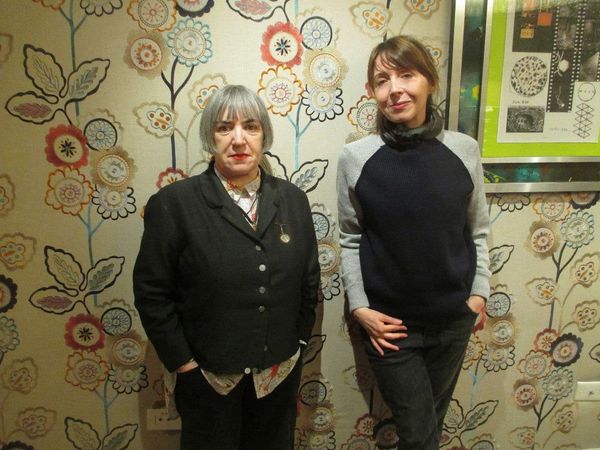 |
| Aisling Walsh with Anne-Katrin Titze on costumes by Trysha Bakker for Sally Hawkin's Maudie: "I wanted her not finely dressed, but rather nicely dressed." Photo: Courtney Richards |
Aisling Walsh's Maudie, screenplay by Sherry White, with a score by Michael Timmons, stars Sally Hawkins as Canadian Folk Artist Maud Lewis (as in Paul King's Paddington, she holds the world together). Ethan Hawke is her husband Everett with Gabrielle Rose as Maud's Aunt Ida, Zachary Bennett as her brother Charles, and a Katharine Hepburn sounding Kari Matchett as a Peggy Guggenheim-like character named Sandra.
At the Crosby Street Hotel in New York, Aisling and I discussed her work with production designer John Hand, costume choices with Trysha Bakker, the paintings of Maud Lewis and her relationship to Everett, their home, and her family, and what it means to be a Naïve Artist.
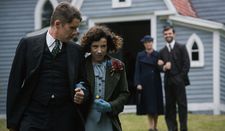 |
| Everett (Ethan Hawke) and Maud Lewis (Sally Hawkins): "And those odd socks become a pair in the end." |
Maud Lewis painted a world of kittens, tulips and reindeer, of butterflies, lumberjacks and snowflakes in July. Aisling Walsh's Maudie scratches the outwardly wide-eyed surface of paint and discovers layers of pain, sacrifice and the cost of survival. Maud, who suffered from juvenile arthritis since her youth, is played with flinty physical awareness by Sally Hawkins and Ethan Hawke as Everett gives one of his most nuanced performances.
After the parents' death, Maud's good-for-nothing brother Charles sold the family house without her knowledge or consent. She is left to live with her Aunt Ida, a woman who nourishes herself with village gossip and starves her soul with what people will say. She is a rather typical specimen of small-town malice and disappointment, as common in the Thirties as it is now. It is the brother, though, who, driven by greed, we surmise, committed an unforgivable sale and betrayal.
Maud, not prone to giving up, answers an ad put up at the local grocery store by Everett, a loner who grew up in an orphanage and lives off selling fish and taking on odd jobs in his small habitat not far from the sea. We are in rural Nova Scotia and the wild beauty of the landscape does, at least for the eye, lessen the harshness of life a little.
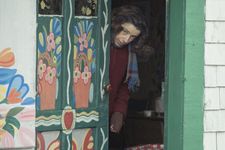 |
| Maud Lewis (Sally Hawkins): "You know, she never traveled more than 25 miles from there in her whole life." |
Anne-Katrin Titze: "We're like a pair of odd socks." Both Sally Hawkins and Ethan Hawke beautifully play odd-sock-ness.
Aisling Walsh: Yeah, they do. When you don't know the story, and many people don't, you can't imagine that she's going to spend 40 years of her life with that man.
AKT: The endless humiliation! "I'd rather stick it into a tree"? How did she bear it?
AW: I think also for him, finding her in that space that he existed in for most of his adult life, it's very hard for him to cope with another person taking up that space. He says at one point, "that corner is mine and don't touch it." But actually you can do anything you want - because he sees that the place has been cleaned a bit.
AKT: Which is so funny, because there she is, making these huge paintings on the walls and furniture and butterflies and swans on the door.
AW: That's what fascinated me. The script [by Sherry White] in the beginning was that portrait of that marriage for 35 or 40 years. How people live like that that quite unexpectedly find each other. And those odd socks become a pair in the end.
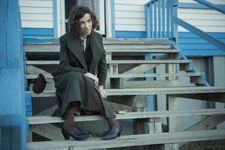 |
| "She lived in a cruel time and she knew that about herself." |
AKT: It's the opposite of love at first sight. It really shows the hard work it takes to be a couple.
AW: And that simple life. They had nothing. They did live on the margins of that rather rural society. No television, no radio, no connection with the world beyond the little local town. You know, she never traveled more than 25 miles from there in her whole life. She found there that magic that kept her fascinated and interested her whole life.
Without one another their lives would have been very different. Without him, I don't know if she'd had that freedom to paint. I'm not saying her life is easy. Without her, I don't think he would have ever been able to say the word love. I don't think he knew what that was before he met her.
AKT: I mean, when he's telling her: "First the dogs, then the chickens and then you." And he means it!
AW: Yes, he does.
AKT: Ethan Hawke plays that beautifully. You totally believe him. The chicken scene is heartbreaking in a way. She is apologising to the chicken. She knows she has to get that chicken - "It's time now" - the dialogue is touching and funny. How did you shoot that scene?
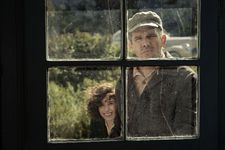 |
| Maud and Everett Lewis: "Without one another their lives would have been very different." |
AW: The first thing she had to do, you know, is to catch the chicken. It's a hard thing to do. My production designer [John Hand], who's Irish, from the rural part of Ireland, I said to him "Show Sally how she can kind of catch the chicken and hold on to it." You hold their legs and whatever you do, hold on to the legs, don't let it go.
AKT: She did it.
AW: She did it and she just kept going. That's the way Sally is. And that first flap is rather magical because the chicken wants to get away and you just keep rolling.
AKT: How many takes?
AW: Not very many. A combination of probably two takes. You just keep going and out of that comes that magical little scene. This town girl in a way. No experience of that kind of rural life. That's her getting into what that sort of life is going to be for them.
AKT: It's like a sacrifice. You see how much she connects to nature and to animals. She knows she has to kill and kill something in herself with that chicken.
AW: That's right. And then she does the painting.
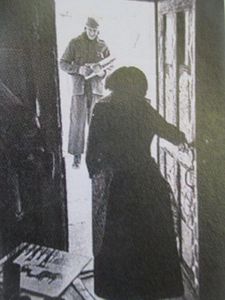 |
| Photograph of Everett and Maud Lewis |
AKT: The painting of the chicken to memorialise it. That's when your film opens up to thoughts of industrialised farming and where we are today. Another sentence cutting to the core is when Maudie comments on the kids throwing rocks at her: "Some people they don't like it if you're deformed."
AW: Yeah and that's the world. I've heard of people, you know, I drove around the area where the house was - people did say, even as an adult, they'd see her walking home and local kids would throw stones at her, "she was strange and a little bit odd," which is kind of sad.
AKT: It feels at times that we are coming full circle, that we live in a time again where things like that are possible. Where people can tweet things like that as if they were throwing stones.
AW: Yeah. Same thing. It's the same thing, as cruel. She lived in a cruel time and she knew that about herself. She spent a lot of her life, I'm sure, to cope with that. Somehow living with him helped her. He was quite uneducated and quite an oddity, living out in this little house on his own for all those years before she arrived.
They found, they recognised something in each other. And it all happened in one go. That's what people did then, in a way to survive. Her paint originally came from the wharf getting little pots of paint from somebody. She didn't use fine materials until much much later.
AKT: I like that you picked the pale nile green as the first colour she discovers.
AW: The house, as you know, is in the art gallery in Halifax.
AKT: Which I really want to see now!
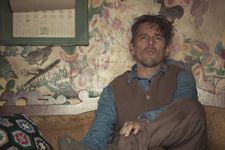 |
| Everett Lewis (Ethan Hawke): "A lot of Ethan's clothes were made but needed to look as though they could have come from somebody else." |
AW: You got to go and see it! Three or four years before she died, that's the state it's in. It's all fully painted. We then had to work back to the very beginning. There's no record of what she first painted. There is no record of second or third or what it looked like after two years and three years. So we had to work that out.
And I said to Sally, around the house she painted trees a lot and maybe it's just something very simple that you do with your finger. She has no brushes and it's a little tree and then that evolves into something else and it's found material. It's something that he would use, I don't know, to paint the henhouse or something.
AKT: The costumes - obviously, realistically - are made up of layers. They also look good and practical. How did you work with your costume designer [Trysha Bakker]?
AW: There are references from the Thirties. You know people didn't have a lot of money. There was a depression in Canada as well as there was here. But where she came from, in the beginning, I wanted her not finely dressed, but rather nicely dressed. The night she goes to the jazz club.
And she has a sense of style and colour. In photographs of Maud toward the end of her life she always had a little hairband or a little brooch. There's a lovely brooch she wore that's a painting palette with brushes on. And then with those clothes you have got to make them look as though you've worn them for 20 years. And men like Everett in those days, they wore layers.
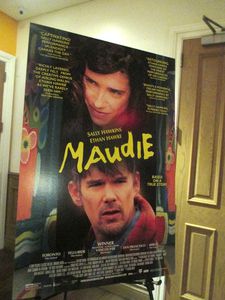 |
| Maudie US poster at the Crosby Street Hotel Photo: Anne-Katrin Titze |
They probably hardly ever took their underwear off. Everything was much tattier and dirtier and worn out. It takes a lot to achieve that. A lot of Ethan's clothes were made but needed to look as though they could have come from somebody else. Never quite fitted him. A bit too loose or a bit too tight or sleeves a bit too short.
AKT: On this picture of Everett in the doorway you see how his pants are too short.
AW: We've had that reference and that little documentary to look at and reference her aprons. People didn't stand out that much in this landscape. Everything was blues and greens. I wanted that red jacket for Ethan because in her pictures Maud painted him and he almost always had a red jacket on. Different jackets over the years but that red is throughout.
AKT: That's his colour for her - love and blood. Like Little Red Riding Hood and the wolf wrapped in one.
Coming up - Aisling Walsh on Maud's paintings, Everett's space, Katharine Hepburn and Kari Matchett, being stuck in the Thirties, and transcending time.
Maudie screens at the Edinburgh International Film Festival later this month and opens theatrically in the US on June 16 and the UK on August 4.





















